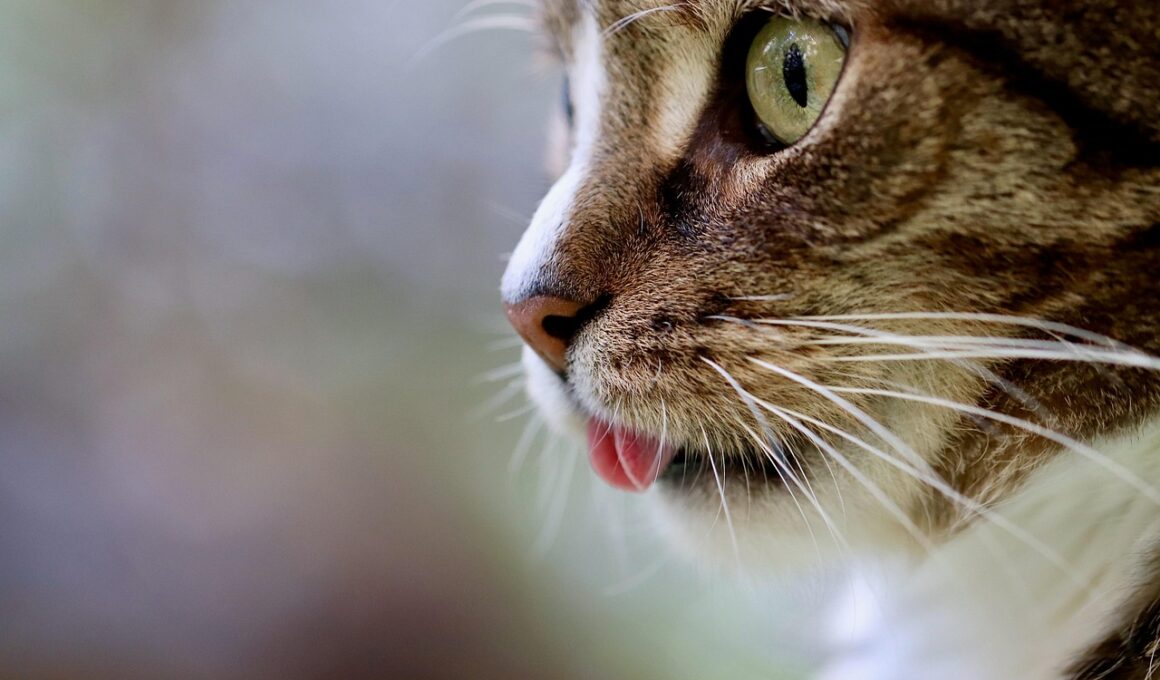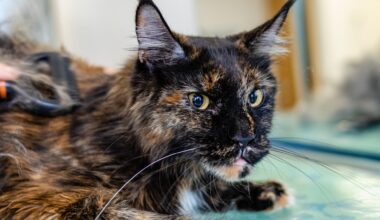Exploring the Connection Between Cat Vitamins and Gut Health
Many cat owners often overlook the importance of vitamins for their felines’ digestive health. Just like humans, cats require essential nutrients to maintain optimal gut function. Vitamins like B-complex and Vitamin C play a significant role in fostering healthy digestion. These vitamins can enhance the absorption of nutrients and aid in breaking down food, thereby preventing gastrointestinal issues. The right balance of vitamins helps regulate gut microbiota, which is vital for overall health. For instance, probiotics can support gut flora, and incorporating them along with essential vitamins can lead to better digestion. Additionally, a well-rounded diet powered by vitamins aids in stimulating the enzymes responsible for digestive processes. Without these vitamins, a cat may experience bloating, constipation, or diarrhea, which can lead to discomfort and distress. Therefore, it’s crucial to provide high-quality vitamin supplements and balanced meals that contain these nutrients. Consulting a veterinarian about the best options available is advisable. A proactive approach to incorporating cat vitamins can significantly enhance your pet’s gut health and reduce the risk of digestive disorders.
The Role of B Vitamins in Digestion
B vitamins, particularly B6, B12, and niacin, are essential for effective digestion in cats. They contribute to energy production and enzyme synthesis, which are critical for breaking down food. Vitamin B6 helps in metabolizing proteins and carbohydrates, thus promoting better energy utilization. On the other hand, Vitamin B12 is vital for cellular health and aids in the production of red blood cells that transport nutrients throughout the body. Niacin functions to promote good digestive health by enhancing the efficiency of digestive enzymes. Furthermore, B vitamins can help mitigate digestive issues, such as diarrhea and bloating, caused by an imbalance in gut flora. When cats are deficient in B vitamins, it may lead to lethargy and poor digestion overall. Thus, including B vitamin supplements in their diet can help maintain not just gut health but overall well-being. Many commercial cat foods are fortified with these vitamins, making it easier for pet owners to ensure that their felines receive the necessary nutrients. Always read labels carefully and choose high-quality options whenever possible.
In addition to B vitamins, Omega-3 fatty acids, often found in fish oil, can also play a significant role in improving gut health. Omega-3s have anti-inflammatory properties that can help alleviate discomfort within the digestive tract. By regulating inflammatory responses, they support the intestinal lining, which is crucial for nutrient absorption and overall gut functioning. Furthermore, ensuring your cat has adequate Omega-3 fatty acids can help protect them from inflammatory bowel diseases and other gastrointestinal disorders. It is also worth noting that the balance of Omega-3 to Omega-6 fatty acids is important as too much Omega-6 can lead to chronic inflammation. Cats primarily get Omega-3 through their diet, particularly from fish. You can also consider supplements specifically formulated for cats. However, always consult your veterinarian before adding any supplements. Too much of any oil can lead to weight gain and health problems. The importance of a balanced diet that not only includes vitamins but also healthy fats cannot be stressed enough for maintaining optimal gut health in cats.
Vitamin C and Antioxidant Benefits
Vitamin C, known for its antioxidant benefits, is another essential nutrient that supports gut health in cats. While cats can produce their own Vitamin C, supplementation can be beneficial, especially in times of stress, illness, or aging. Antioxidants like Vitamin C help combat oxidative stress, which can damage cells including those in the digestive system. Healthy cells mean better digestive function and absorption of key nutrients. Moreover, Vitamin C boosts the immune system, promoting overall health and resilience against digestive disturbances. Stress in cats can lead to a weakened immune system, increasing the likelihood of digestive upset. Therefore, ensuring adequate antioxidant levels through diet or supplementation is essential. Fresh fruits like blueberries can be a good source, but many cats are finicky eaters. You can also consider commercially available cat foods that contain added Vitamin C or use supplements if approved by your vet. Keeping dietary changes gradual will help to avoid digestive issues that often arise from abrupt diet changes. The long-term benefits of antioxidants like Vitamin C cannot be overstated, especially in promoting gut health.
Another essential aspect to consider is the role of fiber in conjunction with vitamins in promoting digestive health. Fiber can facilitate bowel movements, reduce hairballs, and help regulate blood sugar levels. High-fiber diets can also help prevent constipation and diarrhea, essential components of a healthy digestive system. Different types of fiber, such as soluble and insoluble, serve various purposes that contribute positively to gut health. Soluble fiber softens stool, making it easier to pass, while insoluble fiber adds bulk to stool and promotes regularity. A combination of vitamins and fiber is a powerful approach to improving digestion in cats. Foods high in fiber, such as pumpkin and sweet potatoes, can be integrated into your cat’s diet, while also ensuring appropriate vitamin levels. Adding supplements that are high in fiber can provide an effective solution to promote gut function. Always observe how your cat reacts to dietary changes and consult your veterinarian for advice on the best fiber sources suitable for your cat’s specific needs. Consistency in dietary habits significantly contributes to a cat’s overall digestive well-being.
Choosing the Right Supplements
When selecting vitamin supplements for your cat, it is imperative to choose high-quality products designed specifically for felines. Not all supplements are created equal, and some may contain ingredients that are not beneficial or even harmful to your cat’s health. Look for products with ASC, AAFCO approval, ensuring they meet industry standards. Focus on those enriched with essential vitamins and minerals known to support digestion and gut health. Reading reviews and researching the ingredient lists will help you make informed decisions. Additionally, consult with your veterinarian to determine the specific vitamins your cat may need based on their age, health status, and dietary habits. Supplements should be incorporated into a balanced diet and not serve as a replacement. Over-supplementation can lead to toxicity and adverse health effects. Also, consider the preferences of your cat; some may prefer pills while others might enjoy flavored forms. Regular vet check-ups can help monitor your cat’s health and adjust supplements as necessary. Your commitment to your pet’s nutrition will have lasting benefits on their gut health and overall quality of life.
In summary, understanding the critical link between cat vitamins and digestive health can be beneficial to your feline friend. By providing the necessary vitamins such as B-complex, C, and the right balance of Omega-3s alongside fiber, you can significantly improve your cat’s gut health and overall well-being. Proactive care that emphasizes proper nutrition is key to ensuring that your pet remains healthy and vibrant. Always be attentive to changes in your cat’s appetite, digestion, and overall behavior, as these could indicate nutritious deficiencies. At the same time, always consult with a veterinarian when making any changes to your cat’s diet or introducing supplements. Together, you can devise a tailored nutrition plan that meets all their needs—focusing on their digestive health as a priority. Implementing vitamin-rich diets along with fiber and high-quality supplements will help stave off digestive complications, promoting longevity and vitality. Remember, a healthy cat starts with a healthy gut, so investing in vitamins and proper nutrition is one of the best steps you can take for your cherished feline companion.
Conclusion
In conclusion, the connection between cat vitamins and gut health is clear and vital. Vitamins such as B-complex, C, and Omega-3 fatty acids constitute essential components of a balanced diet that support proper digestion. Ensuring your cat receives adequate vitamins can minimize digestion-related problems and improve overall health. Suitable vitamin and nutrient intake contributes not only to a healthy digestive system but also improves energy levels, immune function, and long-term health prospects. Regular vet consultations can help you understand your cat’s unique requirements, helping to tailor their diet effectively. With so many vitamin options and products on the market, taking informed and thoughtful approaches will pay off in enhanced feline health. Keep observing your cat’s behavior and health status while making necessary dietary adjustments. Any positive changes necessitate patience and gradual adaptation. Ultimately, your dedication to their nutrition and well-being will lead to a happier, healthier, and more energetic pet. Adequate vitamins truly make a difference in promoting gut health, ensuring your cat enjoys life to the fullest, with reduced risks of digestive issues.


